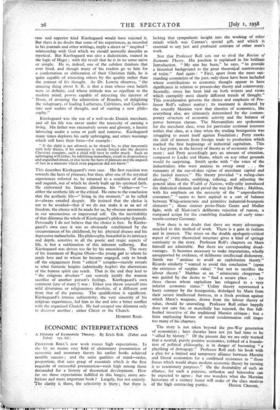ECONOMIC INTERPRETATIONS
Faber. ns. 6d.) PROFESSOR ROLL'S new work rouses high expectations. In the by no means easy field of elementary presentation of economic and monetary theory his earlier books achieved notable success ; and the same qualities of mind—order, proportion, that sure grasp of essentials which is the first requisite of successful presentation—rank high among those demanded for a history of theoretical development. How far arc these expectations fulfilled in this longer, more am- bitious and more important book ? Largely, but not entirely. The clarity is there, the selectivity is there ; but there is lacking that sympathetic insight into the working of other minds which was Cannan's special gift, and which is essential to any just and profound estimate of other men's work.
Not that Professor Roll sets out to rival the Review of Economic Theory. His position is explained in his brilliant Introduction. " My aim has been," he says, " to provide a historical background to the great theoretical controversies of today." And again : " First, apart from the most out- standing economists of the past, only those have been included whose contributions to economic thought appear to have significance in relation to present-day theory and controversy. Secondly, stress has been laid on both writers and views which exemplify most clearly different trends of thought." This consideration governs the choice and emphasis of Pro-
fessor Roll's subject matter ; its treatment is dictated by the soundly Marxian view that theories of economics, like everything else, are ultimately determined by the contem- porary structure of economic activity and the balance of power between classes. The Mercantilists are spokesmen for the merchant class, even for particular sectional interests within that class, at a time when the trading bourgeoisie was struggling to assert itself against Feudalism ; Petty marks the shift of interest from foreign trade to production which marked the first beginnings of industrial capitalism. This is a key point, in the history of theory as of economic develop- ment ; and Petty accordingly gets an amount of attention, ' compared to Locke and Hume, which on any other grounds would be surprising. Smith spoke with " the voice of the industrialists who were anxious to sweep away . . . the remnants of the out-of-date regime of merchant capital and the landed interest." His theory provided " a ruling-class ideology." Ricardo, codifying, refining, and adjusting the general ideas of the Wealth of Nations, willy-nilly introduced the dialectical element and paved the way for Marx; Malthus, with his emphasis on the necessity of the " unproductive consumer,'! " seems to have aspired to a sort of balance between Whig-aristocratic and primitive industrial-bourgeois elements " ; those sinister proto-Nazis Gentz and Muller fight, with all Nazi-ism's deliberate rejection of reason, a rearguard action for the crumbling feudalism of early nine- teenth-century Germany.
NOw there is no doubt that there are many advantages attached to this method of work. There is a gain in realism and in interest. The stress on the double apologeticcritical aspect of every theoretical structure gives a kind of springy continuity to the story. Professor Roll's chapters on Marx himself are admirable. But there are corresponding disad- vantages. It becomes necessary to make imputations, wholly unsupported by evidence, of deliberate intellectual dishonesty. Smith was " anxious to avoid an exploitation theory." Ricardo similarly " wanted to avoid this conclusion " (upon the existence of surplus value) " but not to sacrifice the labour theory." Malthus as an " aristocratic clergyman was guided by the desire to " find a secure place . . . for those classes whom capitalism has relegated to a very inferior economic status." Utility theory represented a hasty scamper by the bourgeoisie, dislodged by Marx from their secure intellectual fortress, to a fresh position against which Marx's weapons, drawn from the labour theory of value, should be unavailing. Professor Roll either happily does not care for, or mercifully has rejected, the fine full- bodied invective of the traditional Marxist critique ; but a faint Unpleasing flavour of moral condemnation still tinges too many of his chapters.
The story is not taken beyond the pre-War generation of economists ; later theories have not yet had time to be " sifted by history." Of the present day we are only warned that a neutral, purely positive economics, 'robbed of a founda- tion of political philosophy, is in danger of becoming a plaything of demagogy." Professor Roll ends his book with a plea for a limited and temporary alliance between Marxist and liberal economists for a combined resistance to "'those forces which would abuse modern economic theory by turning it to reactionary purposes.'.! On the desirability of such an alliance, for such a purpose; orthodox and heterodox can be expected to agree ; but one wonders what the Marxian historians of a century hence will make of the class motives of the high contracting parties. HONOR CAOOME.


















































 Previous page
Previous page